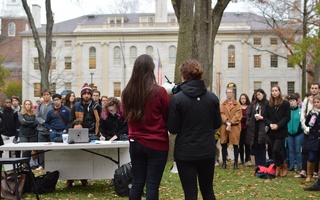{shortcode-3e8932fed9bdb0ca1a1ad6ad109c063ad5ebbc54}
A group of Harvard professors from across disciplines discussed the challenges, impacts, and implications of the #MeToo movement at a panel Monday at the Radcliffe Institute for Advanced Study’s Schlesinger Library.
The event focused on the #MeToo movement, an anti-sexual harassment campaign that has swept the world in recent months and brought down dozens of powerful men. Women have taken to social media to share their stories of sexual harassment with the hashtag #MeToo, prompting a national conversation about harassment in the workplace.
Monday’s panel was moderated by Ann Marie Lipinski, the curator for the Nieman Foundation for Journalism at Harvard, and featured Harvard faculty members David I. Laibson, Evelynn M. Hammonds, Jill Lepore, and Jeannie S. Gersen. The event began with presentations from each panelist, and closed with questions from Lipinski and the audience.
Laibson, an economics professor specializing in behavioral economics, presented first, summarizing the sexual assault climate survey he helped design and administer in 2015. That survey revealed that 31 percent of senior undergraduate women at the College that year had experienced some form of sexual assault while at Harvard.
Laibson pointed out that the survey revealed numerous obstacles to reporting sexual assault that he said still hinder many students at Harvard.
“Our community may worry about the consequences of reporting sexual misconduct. How will this affect my friendships? How will this affect my relationship with the broader university community? Will my doctoral advisor ruin my career?” Laibson said.
Hammonds, a History of Science and African and African American Studies professor, focused on the specific challenges women of color at Harvard might face when weighing whether to report sexual harassment.
“We have to ask on this campus, what does accountability look like for black women students on this campus? Where do you go when you don’t feel comfortable with the Title IX office's ability to enforce accountability?” Hammonds said.
Hammonds added that black students often have difficulty trusting law enforcement officers, which may further limit avenues for reporting assault.
Lepore, a professor of American History, pointed to the shortcomings of feminist movements in the 1920s and 1960s, cautioning attendees that the #MeToo movement could have adverse effects as well.
“This movement might lead to great, long-lasting social justice, but history might also suggest it will lead to something quite, itself, terrible,” Lepore said.
Gersen, a law professor, spoke about the role of due process in adjudicating sexual assault cases, pointing to the need for clarity in definition and accountability for sexual assault charges.
“Due process is for innocent and guilty alike,” she said. “I am so heartened that the conversation has included actual real discussion about what we mean when we say sexual harassment, and what that behavior entails.”
The panel marked the 75th anniversary of Schlesinger Library, which houses a collection centered around the history of women in America. Library Director Jane Kamensky said the aim of the panel was to provide a forum for discussing pressing issues the #MeToo movement has raised.
“I think one of the goals of trying to seize a moment is for dialogue that interrogates how Harvard as a community of intellectuals and experts can help turn viral intensity into meaningful change so that students today, in 45 years, won’t have to say, ‘why are we still having this discussion?’” Kamensky said.
Kamensky said Schlesinger Library will pursue several projects to document the #MeToo movement.
“We’re in the early stages of a digital archiving project which we hope will give a permanent home to a group of digital assets related to this moment so that when people want to study it in a hundred years, there’s a central place to do it,” she said.
—Staff writer Sarah J. Hong can be reached at sarah.hong@thecrimson.com
Read more in News
Koch Foundation Donations Spur Debate at HKSRecommended Articles
-
 ‘Troubling’ Climate of Sexual Assault: One Year Later
‘Troubling’ Climate of Sexual Assault: One Year Later -
 Title IX Officer Mia Karvonides to Leave Harvard
Title IX Officer Mia Karvonides to Leave Harvard -
 DeVos Title IX Review Sparks Concern From Activists
DeVos Title IX Review Sparks Concern From Activists -
If Betsy DeVos Won’t Do It, Harvard MustHarvard must combat the narrative of DeVos’s decision—automatically doubting survivors’ allegations of sexual assault—and, instead, fully attend to students involved in sexual harassment cases.
-
If Democrats Respect Women, Al Franken Should ResignAny Democrat who excuses Franken’s lascivious behavior—whether it be out of cynicism for our political future or another reason—must recognize that they, too, are part of the problem.













